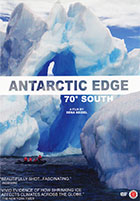
Antarctic Edge: 70o South 2014
Distributed by First Run Features, 630 Ninth Avenue, Suite 1213, New York, NY 10036; 212-243-0600
Produced by Dena Seidel for the Rutgers Center for Digital Filmmaking
Directed by Dena Seidel
DVD , color, 72 min.
Middle School - General Adult
Ecology, Global Warming, Oceanography
Date Entered: 11/19/2015
Reviewed by Cliff Glaviano, formerly with Bowling Green State University Libraries, Bowling Green, OHIn 2012 scientists declared that the decline of the West Antarctic ice sheet is irreversible. Climate warming in that area is occurring at six times the average global rate and a shortened sea ice season threatens the northernmost populations of sea mammals, particularly Adélie penguins. The film concentrates on the 2012-2013 annual expedition from Rutgers University to Palmer Station Antarctica and a 30 day voyage further south to Charcot Island via Avian Island to survey Adélie colonies.
This film was released around the time that a controversial NASA report claimed that sea ice in Antarctica was in fact increasing. Though that report is not countered in the film, the fact that the West Antarctic sea ice season is 90 days shorter now than in the recent past indicates the warming trend has a disruptive effect on the local ecology. While at sea, the Rutgers scientists sample phytoplankton and krill densities in their research area, and photograph and obtain DNA samples from humpback whales. On land at Palmer Station and at Charcot, Adélie populations are measured and tracked during feeding, to assess the likely population viability over the coming Antarctic winter.
The cinematography is superb. Viewers will be able to imagine the dangerous conditions at sea, treacherous ice and rugged terrain in the research area. There is a good exploration of the scientific equipment used, general descriptions of sampling techniques, and a good explanation of robot undersea gliders used to trace penguin feeding habitats. Animations of current charts and the paths of the robot gliders are excellent.
Antarctic Edge is recommended as a first-rate introduction to the conduct of oceanographic research in Antarctic regions. Claims that changes in the Antarctic Circumpolar Current (ACC) result directly from a shorter West Antarctic sea ice season and that melting is contributing to higher sea levels and increased storm intensities are not substantiated in the film. The impact of the shorter sea ice season on Adélie populations, however, is compelling. Similarly, the film lacks comparative data showing decreased carbon deposition from Antarctic krill from changes in the ACC that the researchers expect. Perhaps the data is still being analyzed or may be available online. On the other hand, back stories on the researchers and ship’s crew are topnotch and will serve to point up the extraordinary values and skills of the people who are called to do important work in harsh environments.